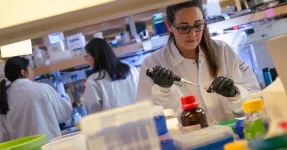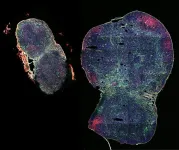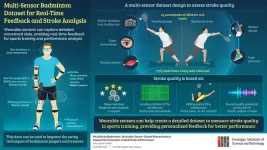(Press-News.org) Scientists at UC San Diego have developed a machine learning algorithm to simulate the time-consuming chemistry involved in the earliest phases of drug discovery, which could significantly streamline the process and open doors for never-before-seen treatments. Identifying candidate drugs for further optimization typically involves thousands of individual experiments, but the new artificial intelligence (AI) platform could potentially give the same results in a fraction of the time. The researchers used the new tool, described in Nature Communications, to synthesize 32 new drug candidates for cancer.
The technology is part of a new but growing trend in pharmaceutical science of using AI to improve drug discovery and development.
“A few years ago, AI was a dirty word in the pharmaceutical industry, but now the trend is definitely the opposite, with biotech startups finding it difficult to raise funds without addressing AI in their business plan,” said senior author Trey Ideker, professor in the Department of Medicine at UC San Diego School of Medicine and adjunct professor of bioengineering and computer science at the UC San Diego Jacobs School of Engineering. “AI-guided drug discovery has become a very active area in industry, but unlike the methods being developed in companies, we’re making our technology open source and accessible to anybody who wants to use it.”
The new platform, called POLYGON, is unique among AI tools for drug discovery in that it can identify molecules with multiple targets, while existing drug discovery protocols currently prioritize single target therapies. Multi-target drugs are of major interest to doctors and scientists because of their potential to deliver the same benefits as combination therapy, in which several different drugs are used together to treat cancer, but with fewer side effects.
“It takes many years and millions of dollars to find and develop a new drug, especially if we’re talking about one with multiple targets.” said Ideker. “The rare few multi-target drugs we do have were discovered largely by chance, but this new technology could help take chance out of the equation and kickstart a new generation of precision medicine.”
The researchers trained POLYGON on a database of over a million known bioactive molecules containing detailed information about their chemical properties and known interactions with protein targets. By learning from patterns found in the database, POLYGON is able to generate original chemical formulas for new candidate drugs that are likely to have certain properties, such as the ability to inhibit specific proteins.
“Just like AI is now very good at generating original drawings and pictures, such as creating pictures of human faces based off desired properties like age or sex, POLYGON is able to generate original molecular compounds based off of desired chemical properties,” said Ideker. “In this case, instead of telling the AI how old we want our face to look, we’re telling it how we want our future drug to interact with disease proteins.”
To put POLYGON to the test, the researchers used it to generate hundreds of candidate drugs that target various pairs of cancer-related proteins. Of these, the researchers synthesized 32 molecules that had the strongest predicted interactions with the MEK1 and mTOR proteins, a pair of cellular signaling proteins that are a promising target for cancer combination therapy. These two proteins are what scientists call synthetically lethal, which means that inhibiting both together is enough to kill cancer cells even if inhibiting one alone is not.
The researchers found that the drugs they synthesized had significant activity against MEK1 and mTOR, but had few off-target reactions with other proteins. This suggests that one or more of the drugs identified by POLYGON could be able to target both proteins as a cancer treatment, providing a list of choices for fine-tuning by human chemists.
“Once you have the candidate drugs, you still need to do all the other chemistry it takes to refine those options into a single, effective treatment,” said Ideker. “We can’t and shouldn’t try to eliminate human expertise from the drug discovery pipeline, but what we can do is shorten a few steps of the process.”
Despite this caution, the researchers are optimistic that the possibilities of AI for drug discovery are only just being explored.
“Seeing how this concept plays out over the next decade, both in academia and in the private sector, is going to be very exciting.” said Ideker. “The possibilities are virtually endless.”
Full link to study: https://www.nature.com/articles/41467-024-47120-y
Co-authors of the study include: Brenton Munson, Michael Chen, Audrey Bogosian, Jason Kreisberg, Katherine Licon, Abagyan Ruben and Brent Kuenzi, all at UC San Diego.
This study was funded, in part, by the National Institutes of Health (Grants CA274502, GM103504, ES014811, CA243885, CA212456).
# # #
END
Simulated chemistry: New AI platform designs tomorrow’s cancer drugs
The new platform helped UC San Diego scientists synthesize 32 potential multi-target cancer drugs
2024-05-06
ELSE PRESS RELEASES FROM THIS DATE:
Human ‘neural compass’ pinpointed in new study
2024-05-06
A pattern of brain activity that helps prevent us from getting lost has been identified in a new study, published in Nature Human Behaviour.
Researchers at the University of Birmingham and Ludwig Maximilian University of Munich have for the first time been able to pinpoint the location of an internal neural compass which the human brain uses to orientate itself in space and navigate through the environment.
The research identifies finely tuned head direction signals within the brain. The results are comparable to neural codes identified in ...
Personalized screening early in pregnancy may improve preeclampsia detection
2024-05-06
Research Highlights:
A personalized screening algorithm for preeclampsia in the first trimester of pregnancy may help clinicians better predict who is at risk for developing the condition and who may benefit from treatment with a daily, low-dose aspirin.
In this study of more than 7,000 women, the new screening method, which combined maternal history, biomarker tests and ultrasound tests, was better at identifying preeclampsia risk in than current risk factor-based guidelines.
Embargoed until 4 a.m. CT/5 a.m. ET Monday, May 6, 2024
DALLAS, May 6, 2024 — A new screening algorithm for preeclampsia combining maternal history, ...
Expanding a lymph node, boosting a vaccine
2024-05-06
Expanding a lymph node, boosting a vaccine
A biomaterial vaccine enhances and sustains lymph node expansion following vaccination, boosting anti-tumor immunity in an animal model.
By Benjamin Boettner
(BOSTON) — Each one of us has around 600 lymph nodes (LNs) – small, bean-shaped organs that house various types of blood cells and filter lymph fluid – scattered throughout our bodies. Many of us have also experienced some of our LNs to temporarily swelling during infections with viruses or other pathogens. This LN expansion and subsequent contraction can also result from vaccines injected nearby, and in fact ...
GIST-MIT CSAIL researchers develop a biomechanical dataset for badminton performance analysis
2024-05-06
In sports training, practice is the key, but being able to emulate the techniques of professional athletes can take a player’s performance to the next level. AI-based personalized sports coaching assistants can make this a reality by utilizing published datasets. With cameras and sensors strategically placed on the athlete's body, these systems can track everything, including joint movement patterns, muscle activation levels, and gaze movements.
Using this data, personalized feedback is provided on player technique, along with improvement recommendations. Athletes can access this feedback anytime, and anywhere, making these systems versatile for athletes at ...
Study sheds light on 11th century Arab-Muslim optical scientist whose work laid ground for modern-day physics
2024-05-06
Scientists from the University of Sharjah and the Warburg Institute are poring over the writings of an 11th century Arab-Muslim polymath to demonstrate their impact on the development of optical sciences and how they have fundamentally transformed the history of physics from the Middle Ages up to modern times in Europe.
Their research focuses on the legacy of al-Ḥasan Ibn al-Haytham known in Latin as “Alhazen” and particularly his most influential work titled Book of Optics, reputed in Arabic as Kitab al-Manazir and first circulated in Europe via its Latin translation dubbed ‘Perspectiva’. Ibn ...
Rethinking “socially admitted” patients
2024-05-06
Labelling vulnerable patients in hospital as “socially admitted” may prevent treatment of medical issues, according to new research in CMAJ (Canadian Medical Association Journal) https://www.cmaj.ca/lookup/doi/10.1503/cmaj.231430.
Emergency departments are the last resort for some socially vulnerable people who may not have an acute or new medical issue. They may be seeking care because of a breakdown of supports or the inability of the patient, or their family, to cope with living at home. These people are known colloquially as “social admissions,” and other labels such as “orphan patient,” “failure ...
A better way to ride a motorcycle
2024-05-06
Motorcycles are designed to accommodate the average-sized rider, leaving taller and shorter riders vulnerable to discomfort.
A new study from the University of Waterloo used software that predicted realistic motorcycle riding behaviours, considering human factors and ergonomic trade-offs. It found that shorter and taller statures require joint adjustments to achieve their preferred riding posture.
Taller riders are required to flex their ankles, knees, hips and elbows more to interact with the motorcycle properly, ...
Survey of US parents highlights need for more awareness about newborn screening, cystic fibrosis and what to do if results are abnormal
2024-05-05
A national survey led by Ann & Robert H. Lurie Children’s Hospital of Chicago found that parents have insufficient knowledge of newborn screening in general and of cystic fibrosis (CF) in particular. Researchers asked specific questions about CF based on studies showing that initial CF follow-up visits after a positive newborn screening often occur after 4 weeks of age, which is later than the recommended timeframe for best outcomes. Later follow-up is associated with worse nutrition in childhood, a predictor of long-term health in CF. Parents ...
Outcomes of children admitted to a pediatric observation unit with a psychiatric comanagement model
2024-05-05
About The Study: The findings of this study show a significantly lower pediatric emergency department length of stay and inpatient psychiatric admission rate following pediatric observation unit care and potential savings in inpatient psychiatric resources without contributing to 30-day readmission rates.
Authors: Rachel G. Kasdin, M.S., of the Icahn School of Medicine at Mount Sinai in New York, is the corresponding author.
To access the embargoed study: Visit our For The Media website at this link https://media.jamanetwork.com/
(doi:10.1001/jamapediatrics.2024.1123)
Editor’s Note: Please see the article for additional information, including other authors, ...
SCAI announces 2024-25 SCAI-WIN CHIP Fellowship Recipient
2024-05-05
LONG BEACH (May 4, 2024) Mariem A. Sawan, MBBS, chief interventional cardiology fellow at Emory University, has been selected as the recipient of the SCAI-Women in Innovations (SCAI-WIN) CHIP Fellowship, the Society for Cardiovascular Angiography and Interventions announced today.
The $115,000 fellowship opportunity was made possible by support from Abiomed (founding supporter), Boston Scientific, Medtronic, and Shockwave Medical, Inc., and is offered to interventional cardiology (IC) fellows or practicing interventional cardiologists ...
LAST 30 PRESS RELEASES:
New knowledge on heritability paves the way for better treatment of people with chronic inflammatory bowel disease
Under the Lens: Microbiologists Nicola Holden and Gil Domingue weigh in on the raw milk debate
Science reveals why you can’t resist a snack – even when you’re full
Kidney cancer study finds belzutifan plus pembrolizumab post-surgery helps patients at high risk for relapse stay cancer-free longer
Alkali cation effects in electrochemical carbon dioxide reduction
Test platforms for charging wireless cars now fit on a bench
$3 million NIH grant funds national study of Medicare Advantage’s benefit expansion into social supports
Amplified Sciences achieves CAP accreditation for cutting-edge diagnostic lab
Fred Hutch announces 12 recipients of the annual Harold M. Weintraub Graduate Student Award
Native forest litter helps rebuild soil life in post-mining landscapes
Mountain soils in arid regions may emit more greenhouse gas as climate shifts, new study finds
Pairing biochar with other soil amendments could unlock stronger gains in soil health
Why do we get a skip in our step when we’re happy? Thank dopamine
UC Irvine scientists uncover cellular mechanism behind muscle repair
Platform to map living brain noninvasively takes next big step
Stress-testing the Cascadia Subduction Zone reveals variability that could impact how earthquakes spread
We may be underestimating the true carbon cost of northern wildfires
Blood test predicts which bladder cancer patients may safely skip surgery
Kennesaw State's Vijay Anand honored as National Academy of Inventors Senior Member
Recovery from whaling reveals the role of age in Humpback reproduction
Can the canny tick help prevent disease like MS and cancer?
Newcomer children show lower rates of emergency department use for non‑urgent conditions, study finds
Cognitive and neuropsychiatric function in former American football players
From trash to climate tech: rubber gloves find new life as carbon capturers materials
A step towards needed treatments for hantaviruses in new molecular map
Boys are more motivated, while girls are more compassionate?
Study identifies opposing roles for IL6 and IL6R in long-term mortality
AI accurately spots medical disorder from privacy-conscious hand images
Transient Pauli blocking for broadband ultrafast optical switching
Political polarization can spur CO2 emissions, stymie climate action
[Press-News.org] Simulated chemistry: New AI platform designs tomorrow’s cancer drugsThe new platform helped UC San Diego scientists synthesize 32 potential multi-target cancer drugs







